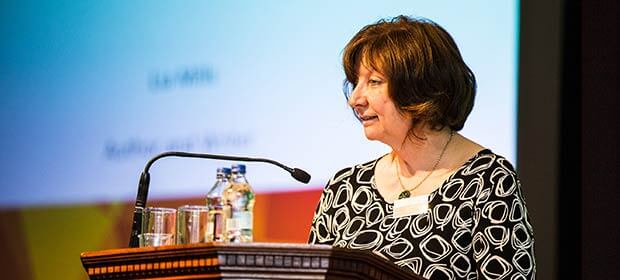Drawing on her own experience as a patient and advocate, author and writer, Lia Mills provided the Conference with a personal perspective on the importance of the values of compassion and respect for patients.

She told the Conference that ten years she ago she was diagnosed with carcinoma, which had spread to several lymph nodes. She had radical surgery, followed by aggressive chemotherapy.
“My care was managed by several different interdisciplinary teams in three different hospitals. I spent about ten weeks in hospital because my diagnosis was late. I urge you to consider supporting a broad public awareness of early signs of illness. In the long run it will save time, resources and money.”
Ms. Mills said “respect and compassion” had a whiff of hierarchy. It might be better to have “recognition and empathy” which were less about managing a person and more about where they might be coming from.
She is sizzling with nerves and trepidation but time is not on her side and she has to wait a long time.
“I have had encounters with cleaning staff and catering staff on wards which meant far more than those people probably realised. Communications probably matters more in healthcare settings than others, because patients are fearful of the illness and may have a phobia about ageing, illness and death. Then even if you speak to them in plain English there may be a big gap between what you say and what they think you say.”
Ms. Mills invited her audience to consider the case of an imaginary patient called Mary and the problems she could encounter. These, she said, came from an amalgam of experiences in a number of clinics and hospitals.
“Mary has a nine year old autistic grandson whom she is minding. She is teaching him music and planning to move on to reading. She has had a problem, which has been nagging at her for weeks before she went to her GP. He sends on a letter to the clinic. Now she knows there may be serious implications and she has to wait to be seen. She is sizzling with nerves and trepidation but time is not on her side and she has to wait a long time
“This plants an idea in her mind that she doesn’t really matter much in this equation. She can just get in line and wait to get it dealt with.
“Finally the day comes and she sets off for hospital, worrying if will she be back in time to let her grandson in.
“She doesn’t know where she is going, and I think one way to provide real understanding would be to provide her with all the information she needs in advance.
“All the car parks nearest the building where she needs to go are for staff and she has to leave her car and walk through rain. She is worried she might be late. When she gets there, all the chairs are gone and she can only get a seat in front of the radiator. She starts to sweat.
Put yourself in the person’s shoes at every level from the design of the building to the running of clinics and hospitals.
“She is left to wait and gets the impression that her time is of no importance to the people who run the clinic. She has medication to take at lunchtime, but she has left it in the car, which is far away and it is raining.
“An announcement to explain the delay would go a long way towards calming the tense atmosphere.
“The cost of car parks can be a really serious cost as can the cost of tea and scones in the cafe if you have to have something.
“When Mary is called, it would help if the person looked her in the eye, introduced himself or herself and apologised for keeping her waiting.
“What she really needs is an ally, someone to take her part and guide her through the system. I think the single best thing the health service could do is have a patient advocate on the staff, to take over responsibility for tracking down results and keeping an eye on consultations so they don’t clash.
“Or you could even have a patients’ forum where you could invite patients to describe problems they are encountering and advise on solutions. Please try and see your patients as persons. Put Yourself in the person’s shoes at every level from the design of the building to the running of clinics and hospitals.

